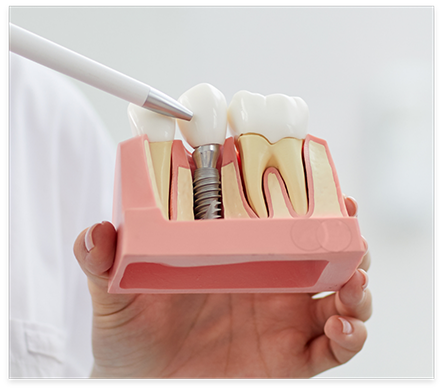Dental Implants Nocatee
Crafting Permanent Smiles That Can Last a Lifetime
When considering your options for tooth replacement, you might appreciate the reliability offered by dental bridges and dentures; however, you may prefer the permanence provided by dental implants. As long-lasting prosthetics that replace the crown of a tooth as well as its root, these small titanium posts can change the way you view yourself and your smile for the rest of your life. Give us a call to find out how you can take advantage of dental implants in Nocatee at Palm Leaf Dental.
Why Choose Palm Leaf Dental for Dental Implants?
- Partnered with Local Specialists for Optimal Results
- All-On-4 Dental Implants Are Available
- We Will Work to Maximize Your Dental Benefits
What Are Dental Implants?

Dental implants are the only known root-to-crown tooth replacement. Offering the same level of stimulation and stability as natural teeth, they are surgically placed within the jawbone and can last a lifetime with proper care. Their versatility makes them suitable for supporting crowns, bridges, and dentures, even All-On-4.
The 4-Step Dental Implant Process

- Initial Consultation – You must first schedule a consultation with Dr. Broe. Here, you will learn if you can immediately receive dental implants or if you require additional care, such as bone grafting, gum disease treatment, etc. In some cases, we may be able to suggest All-On-4 implants to avoid a grafting or sinus lift procedure.
- Dental Implant Surgery – We partner with outside dental implant specialists so that your posts can be positioned and placed appropriately. Using local anesthesia, you will feel nothing throughout your procedure.
- Osseointegration/Abutment – Once your healing caps are in place, we will send you home to recover for 4-6 months. Osseointegration will occur during this time, effectively fusing the implants with the bone tissues. Once you’re fully recovered, you will receive your metal abutments, which are attachments that hold the restoration to the implant.
- Delivery of the Final Restoration – To complete the dental implant process, you will receive your custom crown, bridge, or denture, which will be secured on top of your implant posts.
Benefits of Dental Implants

- Greater confidence because of the more youthful appearance you will see
- The ability to eat all of your favorite foods and avoid the embarrassment of accidental slippage
- Stronger bite force and chewing power
- A more cost-effective form of treatment, as you will not need denture adhesive or regular replacements over time
- Improved jawbone stimulation that reduces the risk of facial collapse and bone loss
Maintaining & Caring for Your Dental Implant

Dental implants fuse with your jawbone through osseointegration, allowing them to last significantly longer than traditional bridges or dentures. With proper care, your new smile could easily last 30 years or even a lifetime! Fortunately, maintaining dental implants is straightforward and requires just a few simple steps. Here’s how you can ensure your implants remain in excellent condition.
Make Oral Hygiene a Priority

While dental implants are resistant to cavities, maintaining good oral hygiene is still crucial. In fact, it’s more important than ever. Poor oral hygiene can lead to gum disease, which is a leading cause of dental implant failure.
To keep your implants and the surrounding gum tissue healthy, it’s essential to maintain a clean mouth. Brush both your natural teeth and implants every morning and night, floss daily, and use an ADA-approved mouthwash regularly. This routine will help ensure the longevity and success of your dental implants.
Eat a Healthy Diet

Dental implants allow you to enjoy a wide range of foods but be cautious with overly hard or sticky items as they can damage or loosen your restoration. You should only eat these foods in moderation. For optimal implant health, include calcium-rich dairy products and leafy greens in your diet. These foods support a strong jawbone and healthy gums, providing a solid foundation for your dental implants and helping them last a lifetime.
Break Bad Habits

Certain habits can jeopardize your dental implants, with smoking being one of the most detrimental. Tobacco use (smoking, vaping, or chewing) can impair healing and prevent osseointegration, leading to implant failure. Smokers are also more than twice as likely to develop gum disease. We strongly recommend quitting tobacco at least two weeks before and ideally after surgery. Another harmful habit is chewing on hard or inedible objects, which can damage your implants. Instead of biting nails or chewing ice, try chewing sugar-free gum to protect your implants.
Protect Your Dental Implants

Dental implants may be durable, but they are not immune to damage. If you play sports, protect them with a custom mouthguard designed by your implant dentist to guard against impact. Similarly, if you grind your teeth at night, wearing a nightguard is essential. Chronic grinding can weaken and damage your implants, so a nightguard helps preserve their integrity and longevity.
Schedule Regular Dental Checkups

Even if you have no natural teeth remaining, regular dental checkups and cleanings are essential. These visits allow us to monitor the health of your dental implants and address any issues early. By catching and treating minor problems before they get worse, you can save time and money in the long run.
Understanding the Cost of Dental Implants

As effective as they are, you may worry that dental implants cost too much. Wouldn’t the gold standards of tooth replacement be a really expensive buy? However, the cost of dental implants varies by patient; you’ll need to consult our dentists for a precise estimate. Our team will also work to make your care affordable, walking you through its pricing factors, dental insurance, etc. For more precise details, simply keep reading or call our office.
Preliminary Treatments & Dental Implant Surgery

In some cases, a patient needs other dental services before dental implant surgery. These “extra” options can range from simple tooth extraction to gum disease therapy or bone grafts. If added to your care, they’ll add to your treatment expense; the upside is that dental insurance can partly cover them.
Don’t forget that dental implant surgery also incurs its own price. Based on factors like implant location, sedation options, and the treating surgeon, placement can cost more or less. Still, our practice ensures the surgery is worth its expense by working with local specialists. They’ll discuss exactly what you can expect to pay at the appropriate time.
The Parts of Your Dental Implant

Of course, even your dental implants’ parts and features affect the final cost. These include:
- Implant Number – A dental implant treatment will cost more as more implants are placed.
- Implant Material – Based on your case, your dental implant(s) may use pricier materials like zirconia instead of titanium.
- Implant Brand – Dental implant brand also affects the price, as different manufacturers make implants differently.
- Restoration Type – Ultimately, dental crowns, bridges, and dentures have different costs.
How Dental Implants Pay for Themselves

While dentures and dental bridges do have lower upfront prices, dental implants are still more cost-effective. Getting them as replacement teeth will save you money in the long run.
Remember, dental implants can last 30 years or more (with proper care). They don’t need frequent repair or replacement work like other tooth replacements do. To that extent, patients can clean them like natural teeth and save money otherwise spent on dental care. Your new teeth would “pay off” more than dentures or dental bridges ever would.
Does My Dental Insurance Cover Dental Implants?

Dental insurance rarely covers dental implants, but exceptions do exist. There’s a chance your own plan offers benefits for a percentage of the restoration, a preliminary service, etc. That being the case, you could get a meaningful discount on your treatment.
You’ll ultimately want to consult your plan provider before you commit to anything. If you need help doing so, our team will gladly assist you.
Making Dental Implants Affordable

Regardless of dental insurance, it’s possible to make dental implants more affordable. You can rely on our practice’s payment options to ensure a manageable cost.
For example, our office happens to work with CareCredit – a reputable, 3rd party financial lender. They’d let you pay for dental implants in small monthly installments with little or no interest. That way, you could cover your treatment cost gradually.
Getting high-quality dental implants doesn’t have to “break the bank.” Instead, visit our office and learn how to finance your new teeth!
Dental Implant FAQs
How Long Do Dental Implants Last?
Dental implants can last for thirty years or more, which is several times longer than traditional bridges or dentures, but their exact lifespan depends mostly on the quality of the care they receive. To make your new teeth last as long as possible, stick to a daily oral hygiene regimen that includes brushing, flossing, and using antibacterial mouthwash. It’s also a great idea to avoid eating items that are too hard or sticky as well as opening bottles or packages with your teeth. Smoking is horrible for your oral health and a leading cause of implant failure, so kicking this habit can set your implants up for a long life.
Does Getting Dental Implants Hurt?
Before placing your dental implants, our dentist will administer a local anesthetic to ensure that you feel no pain during the procedure. The jawbone does not have many nerve endings in the first place, so there isn’t much discomfort involved after the procedure. While you may have a sore mouth for a few days, you can reduce this discomfort with over-the-counter pain medication or cold by applying a cold compress. If your discomfort seems to be getting worse after two or three days, contact our office in Ponte Vedra Beach.
Are Dental Implants Safe?
Dental Implants are incredibly safe for patients with sufficiently healthy mouths as long as they are placed by a qualified professional. While gum disease or low density in your jawbone may preclude you from receiving dental implants immediately, you may be able to become an excellent candidate for them later after treatments like gum disease therapy or bone grafts. While conditions like cancer, diabetes, and autoimmune disorders can complicate the surgery and healing process, we can discuss them during your consultation and develop your treatment plan accordingly.
How Successful Are Dental Implants?
Dental implants placed by a skilled professional boast a remarkable success rate of over 95% even after ten years, making them a sound investment in your oral health, appearance, and confidence as long as you commit to proper oral hygiene. You can help your implants last longer by brushing and flossing daily, attending regular dental exams and cleanings at our office, and eating a healthy diet. The lifespan of a dental implant can also be influenced by its location in the mouth, as molars may fail sooner than incisors since they endure more strain during the chewing process.
What Can Cause Dental Implants to Fail?
While dental implant failure is uncommon, it usually occurs due to peri-implantitis or failed osseointegration. Peri-implantitis is a gum infection that arises due to poor oral hygiene and results in damage to the bones and soft tissues supporting the implant, causing it to become loose. Osseointegration, on the other hand, happens when the implant fails to fuse properly with the bone tissue surrounding it, and it is much more likely if the patient has low bone density to begin with. Dental implants may also fail due to chronic teeth grinding, a tobacco habit, insufficient oral hygiene, certain medications, the head or neck being exposed to radiation, and health conditions like cancer, diabetes, osteoporosis, and autoimmune disorders. Our team will be happy to give you all the information you need to prevent implant failure during your consultation.
